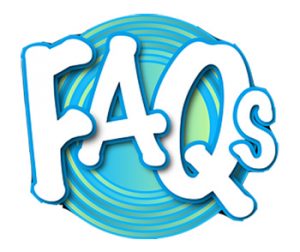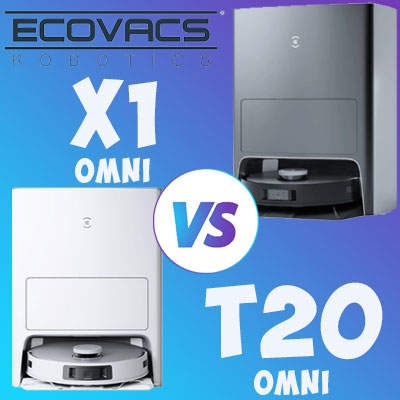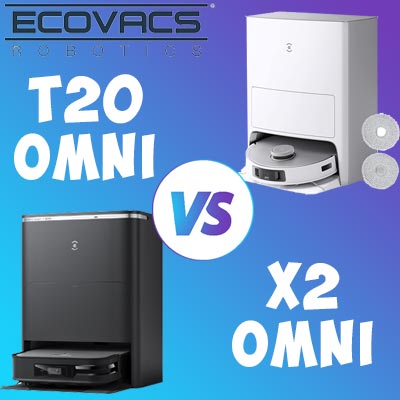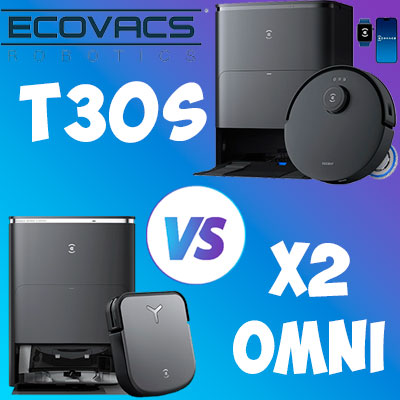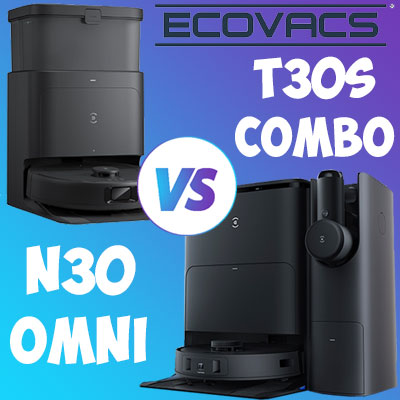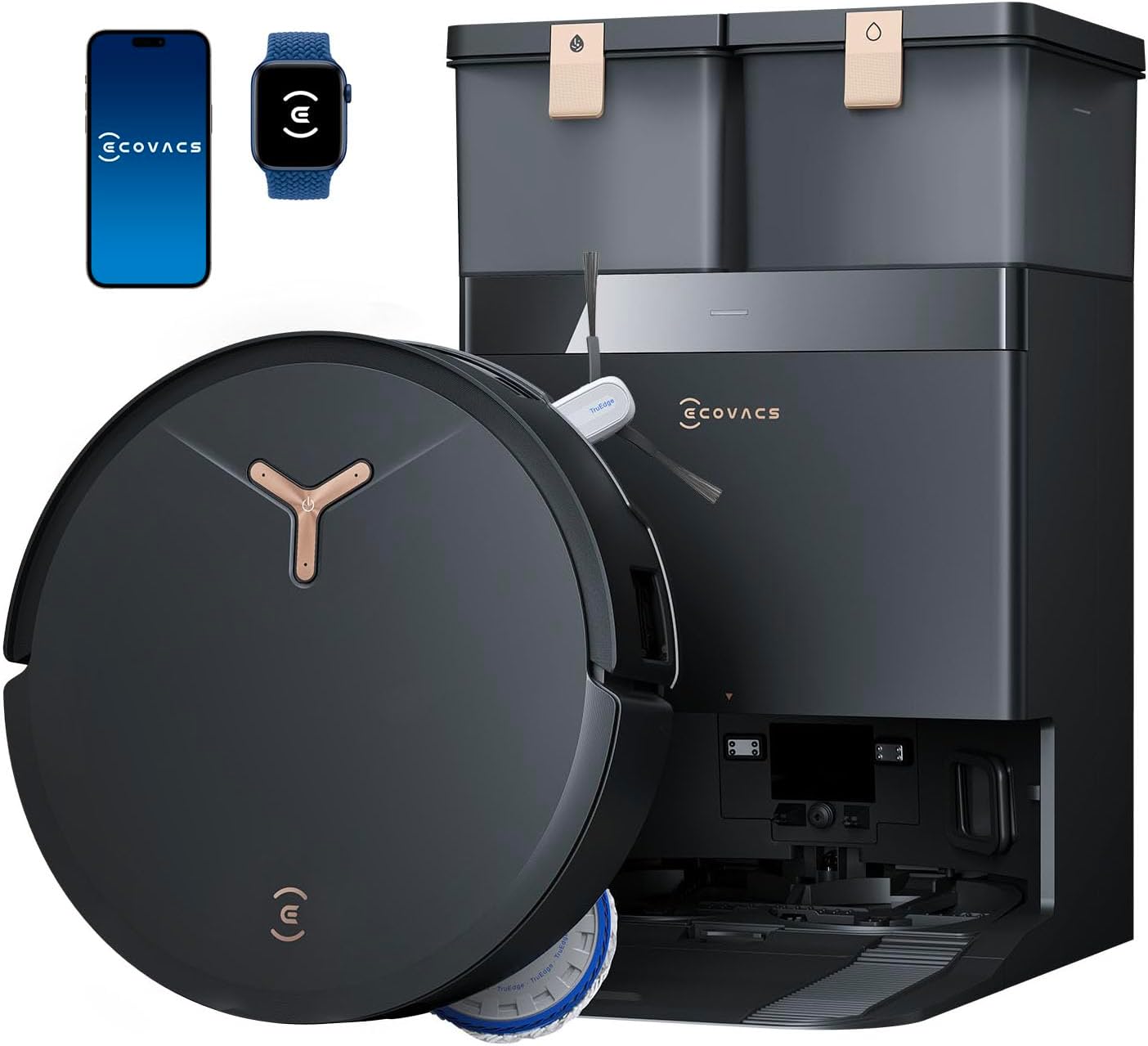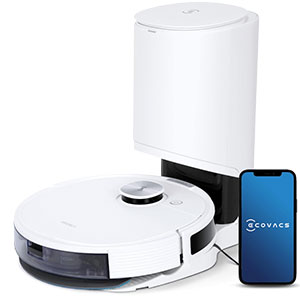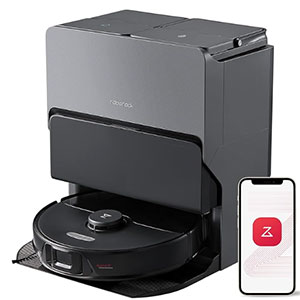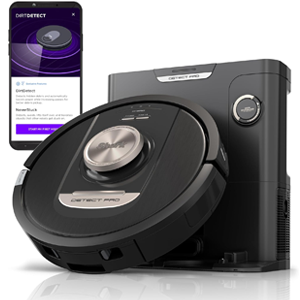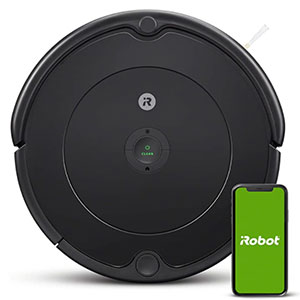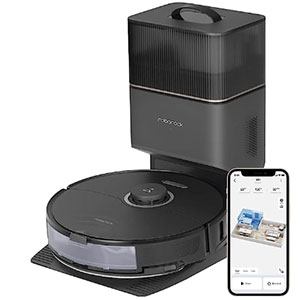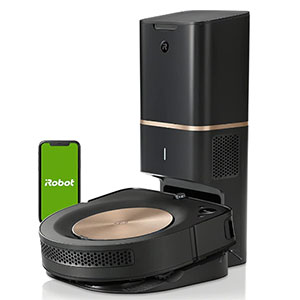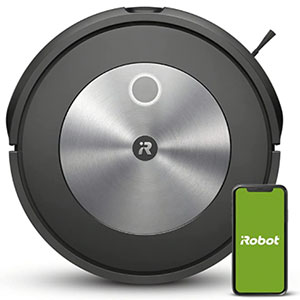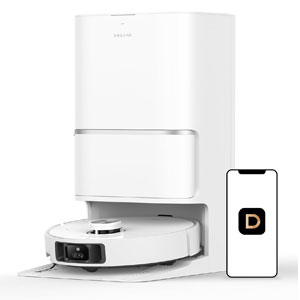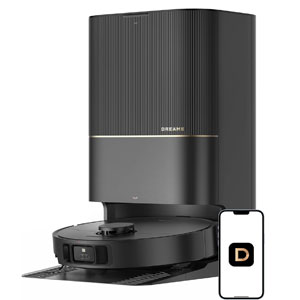Deebot T20 vs. T30 – Comparison Review
Deebot T20 Omni
Deebot T30S
Deebot T20 Omni
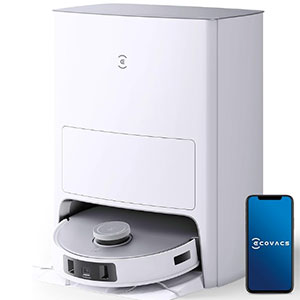
- Dimensions 14.25" x 14.25" x 4.07"
- Weight 9.7 pounds
- Station Size (LxWxH) 17.64”x16.93”x22.76”
- Station Weight 31 pounds
- Maximum runtime 260 minutes
- Input 20 V == 2 A
- Rated power 45 W
- Maximum robot noise level 65 dBA
- Batteries 1 Li-ion
- Recharge and resume Automatic
- Charging time 6.5 hours
- Mopping performance Yes
- Hands-free dust storage Yes
- Ultrasonic carpet detection Yes
- Multi-floor mapping Yes
- Mopping pad lift 0.35”
- Warranty 1 year
- Return and exchange policy 30 days

Deebot T30S
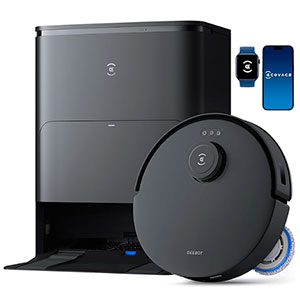
- Dimensions 13.82”x13.82”x4.09”
- Weight 9 pounds
- Station Size (LxWxH) 15.51”x17.44”x20.77”
- Station Weight 31.7 pounds
- Maximum runtime 290 minutes
- Input 20 V == 2 A
- Rated power 60 W
- Maximum robot noise level 67 dBA
- Batteries 1 Li-ion
- Recharge and resume Automatic
- Charging time 3.1 hours
- Mopping performance Yes
- Hands-free dust storage Yes
- Ultrasonic carpet detection Yes
- Multi-floor mapping Yes
- Mopping pad lift 0.35”
- Warranty 1 year
- Return and exchange policy 30 days
Modern homeowners and I have already realized that robotic cleaners are perfect helpers for the everyday cleaning of hard floors and carpets. The most advanced models can mop and vacuum, and at the same time, they have a self-cleaning docking station for emptying dust bins and refilling. You do not need to perform manual cleaning in weeks with these intelligent devices.
Ecovacs has been the manufacturer of Deebot robotic vacuums and mops for more than twenty years. Their models are equipped with high-end features and are highly recommended by numerous customers. T20 and T30 are some of the latest models from Deebot model range, so I will compare Deebot T20 vs. T30 to find out the differences between them, their performance, navigation, and other technical parameters. I will start with the main overview and look more deeply at the essential features.
Check Price
Deebot T20 vs. T30 – Face-to-face comparison
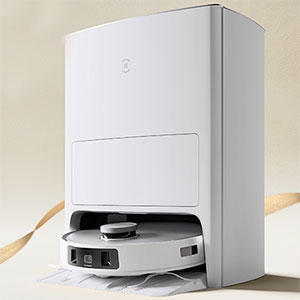
Deebot T20 is a white round robot with a grey top cover and TrueMapping Distance sensor (detection range 10 m) with a microphone on top. There are plenty of sensors on the robot in different locations: In front – TrueDetect 3D sensor (detection is 0.35m); on both sides – are anti-collusion and anti-drop sensors, and on the bottom are ultrasonic sensors (for carpet detection).
The robot is protected from accidental crashes with a bumper in front. On the lid is one auto mode button, under the lid is a power switch button and a reset button to restore to default settings. On the back side, there are two charging contacts at the docking station.
The robot is slim – about 4 inches – to go under the furniture. For moving, it uses two driving rubber wheels around a floating brush.
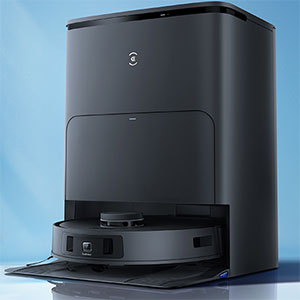
Deebot T30S is a black round robot with a black top. In different places on the robot, several sensors are located: TrueMapping Sensor on top of the robot with a measurement range of 8 m, TrueDetect 3D Sensor in front with a detection distance of 0.35 m, anti-collision sensors with edge sensors on both sides to prevent missing spots and collisions, anti-drop sensors with a trigger distance 60 mm and carpet sensors on the bottom.
On top of the robot are three buttons. Also, three microphones are located on the TrueMapping sensor, and under the lid is a data transfer port for professional maintenance use only.
On the back of the robot, two charging contacts are located for charging at the docking station. Two rubber wheels on the bottom help the robot to move on the floor.
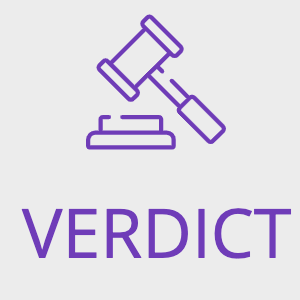

I can’t find any significant differences between Deebot T20 and T30 in terms of the design and dimensions of both robots. They are mainly different in color, and a special transfer port is available only in T30 model. Nevertheless, there is no winner in this round.
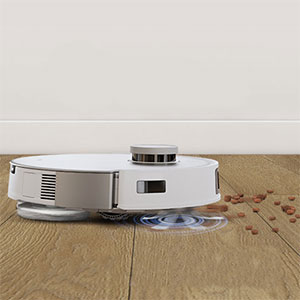
T20 can be cleaned in auto, custom, manual, and spot modes. In all these modes, the robot can perform vacuum and mop functions separately or simultaneously.
The robot automatically detects carpets and increases suction power accordingly for maximum suction. In the standard mode, the noise level is up to 69 dBa in sweep and mop mode, which I consider a reasonable level.
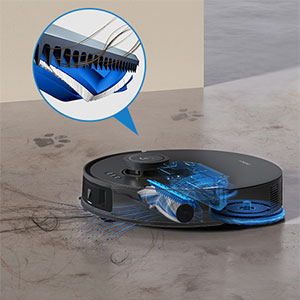
T30 can be cleaned in multiple modes: individual mop and vacuum or simultaneous vacuum and mop. All cleaning modes are available in auto, manual, custom, and spot modes.
I proved that the carpet sensors were working the same way and boosted the suction. The maximum noise level is up to 65 dBa in all modes.


T20 and T30 have the same cleaning orientation and cleaning modes. T30 works calmly in all modes compared to T20, so it is the winner in this comparison.
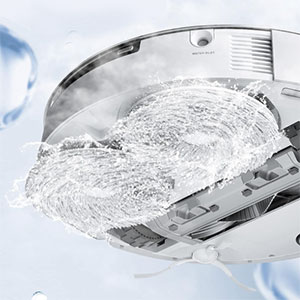
Deebot T20 for mopping is equipped with two rotating pad plates (180 RPM and 6N download pressure) on which two washable mopping pads are assembled. It cleans using OZMO Turbo 2.0 technology. The internal water tank size is 80 ml, and it has 3 level water levels for manual and automatic adjustment.
The mop dimension is 123 cm2, and the maximum mopping area is 400 m2. I checked that with a mopping pad; the robot can cross the barriers up to 0.79”. On carpets, the mopping pads are lifted automatically at 0.35”.
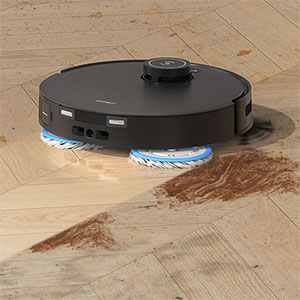
Deebot T30 has the same features as T20: two dual spinning mopping pad plates where washable mopping pads are attached. The water tank capacity is 55 ml. The diameter of one mopping pad is 136 cm. The water tank can be adjusted to three levels – low, medium, and high.
The mopping pads are lifted 0.35”, and the robot can cross the barrier 0.79” in height. The robot has a special cleaning mop mode – hot water mopping the floor. I like that the robot automatically passes two times and light stains and one time light stains.


Deebot T30 is different from T20 as it can clean the floor with hot water. However, Deebot T20 has a larger capacity for the water tank. So, I can’t call the winner of this round.
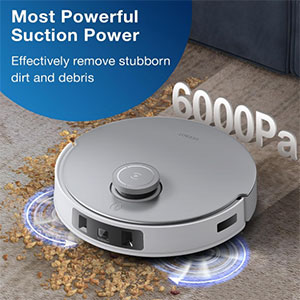
Deebot T20 has a powerful suction power of 6000 Pa to suck all dust and debris from carpets, tiles, and hard and wooden floors.
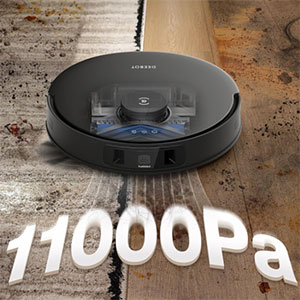
Deebot T30 has an unbeatable powerful suction power of 11000 Pa, driven by advanced floor technology, to effortlessly clean carpets.


Deebot T30 is the winner as it has almost double the maximum suction power compared to T20.
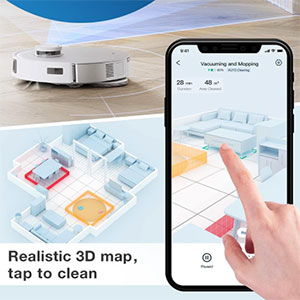
Deebot T20 uses multiple sensors and LIDAR navigation, structured light technology, 3D map algorithms, and 3D scanning technology to efficiently clean all types of floors and avoid obstacles and hazards.
The detection technology is four times higher than with previous technologies. The robot quickly builds precise 3D maps for further customization in the smartphone app and sets no-go zones and virtual walls.
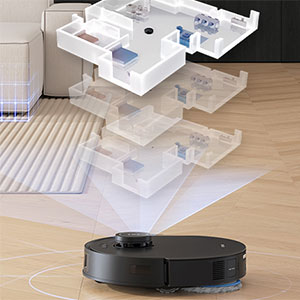
Deebot T30 has several technologies for cleaning floors: TruEdge technology for cleaning corners, TrueDetect 3D 3.0 for obstacle avoidance, and TrueMapping 2.0 for creating 3D and 2D maps quickly with a speed of 181.2 sq. feet per minute.
All technologies ensure optimized floor cleaning without missing spots, and the process can be customized from a smartphone app.


Deebot T30 obtains advanced navigation and mapping technologies compared to T20, which leads to faster and more precise maps. So, I think that T30 is the winner in this part.
T20 robot is equipped in a dustbin with a washable antibacterial high efficiency filter (5.12 inches in length) and is categorized as E11. The inlet of a dustbox is also protected with a net before the filter. The filter can capture up to 99.99% of dust particles, pollen, and other substances. I like the filter, which is made from eco-friendly materials.
T30 robot has a washable HEPA filter (4.13 inches in length) made from high-strength, eco-friendly materials. It lasts longer with regular washing and captures 99.99% of all dust particles, which is categorized as F9. To prolong service life and improve dust capture, the filter net and cotton cloth are used.


Although there is no significant difference in efficiency between Deebot T20 and T30 filters, T30 has an additional cotton layer. T30 is the winner. These filters are different sizes, so I can’t exchange them.
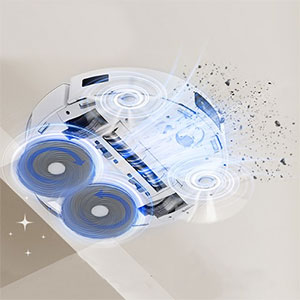
Deebot T20 has two side brushes with plastic bristles to reach all edges and corners and one main floating all-rubber high-quality brush.
The brush has tangle detection to effectively collect pet hair and reduce hair tangling. I can easily clean brushes with a cleaning brush.
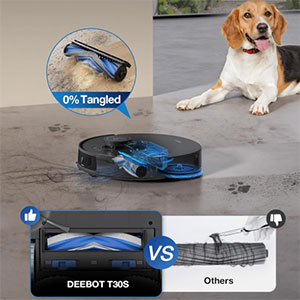
Deebot T30 is equipped with a floating main brush designed with zero tangling and one side plastic brushes.
The main brush consists of a rubber core and plastic bristles. The design of the brushes improves the suction by more than 200%.


The brushes of Deebot T20 and T30 are similar in design, so there is no winner in this part of the comparison. T30 has only one side brush, but is close in performance to T20.
T20 robot has two tanks—a dustbin with a filter and dust bag handle and a three-level water adjustment.
After I remove the lid, the tanks are accessible from the top. The water tank has a low water level alert.
T30 robot also has a dustbin with a cartridge filter and a water tank. The water tank is auto-refilled from the docking station using the water-filling port on the back of the robot.
Both tanks are accessed from the top of the robot. The water tank is equipped with a low water alert function.


Even though T20 has a larger dustbin and water tank, both T20 and T30 have a low water level alert. So, T20 is the winner.
T20 has a high-quality 14,4М Li-ion battery with a long service life. It is protected from short-circuits, over-voltage, over-hear, and over-current. The robot is compatible only with authorized batteries from authorized dealers.
I prove that on the low battery level, the robot goes automatically to the docking station for charging and resumes at the same spot where it has stopped. The full charging time is 6.5 hours. The working time in vacuum and mop mode is 170 minutes on a single charge; in vacuum-only mode, it achieves even 260 minutes.
T30 has a long-lasting 5200 mAh Li-ion battery that has a fast charging function, ensuring full charge in 3.1 hours. Like most modern models, it recharges automatically with low levels and resumes.
However, the large battery capacity ensures up to 200 minutes of working time in simultaneous vacuum and mop time. In silent mode on hard floors, the robot can vacuum for up to 290 minutes, while in standard mode, it vacuums for 220 minutes. This model works only with approved and compatible batteries.


Although the batteries of both models have the same capacity, 5200 mAh, T30 model makes it work longer on a single charge and covers more floor and carpet surfaces. Correspondingly, T30 is the winner in this comparison.
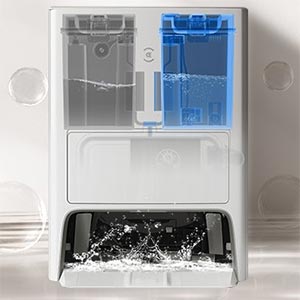
Apart from the charging function, T20 docking station offers many other features for automatic regular maintenance. It washes mopping pads and dries them with hot air for 2 hours (a default time), collects dust from a dustbin in 10 seconds into a 3L dust bag, keeps dust for weeks (up to 75 days), and cleans the station from one press of a button.
The noise collection noise is about 81 dBA, but you can schedule the dust emptying time in your app. For cleaning mopping pads, hot water at a temperature of 131 F is used to dissolve dirt, and oil is used after that is rapidly dried with hot air to prevent odor.
The clean water for self-cleaning and mopping pad cleaning is stored in a 4L clean water tank; the dirty water is collected in a 4 L tank.
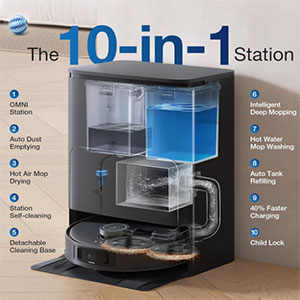
In addition to fast charging (40% faster than other robot vacuums) T30 docking station can perform numerous functions for ultimate hands-free cleaning.
It automatically empties the dustbin and stores it for 90 days in a 3 L dust bag, washes the mopping pad with hot water (158 F) and dries with hot air, auto-refills a water tank, and intelligently deep cleans the station itself. The clean base is easily detachable for manual cleaning.
The dirty water is stored in a 3.5 L dirty water tank, and the clean water for refill and cleaning is stored in a 4 L clean water tank. Dust collection noise achieves 78 dBA. The rated power of a dust collection is 7A.


Obviously, the docking station of Deebot T30 is more functional, making this model the winner in Deebot T20 vs. T30 comparison.
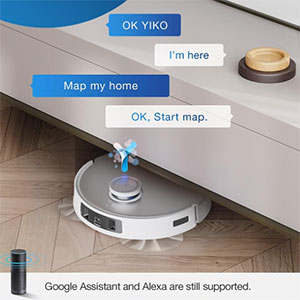
Deebot T20 is controlled not only by one auto button on the body but also using the ECOVACS smartphone app and voice assistant, including its own YIKO assistant, which understands natural language commands.
You can customize cleaning in the app or use voice control by choosing the required room, area, or cleaning mode. In the app, I can also correct the 3D map, check status, set schedules, identify no-go zones and virtual boundaries, and more.
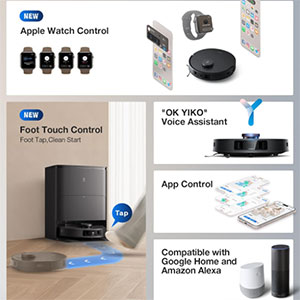
Deebot T30 has three buttons on the button and smartphone for control. It is also compatible with Alexa, Google Assistant, and YIKO Assistant 2.0. You can control the status not only in the Smartphone app but also in the Apple Watch.
The app is recommended for setting schedules, no-go zones, and boundaries; I can send the robot for cleaning with a specific cleaning mode to a room or area from the app.


The Deboot T20 and T30 are similar in terms of smart and control features. Even though T30 supports the Apple Watch and uses YIKO 2.0 for voice control, this does not significantly impact the control features. Both these robots are smart, and there is no winner.
Deebot T20 comes with:
- Robot Vacuum
- Docking station
- 2 Mopping pads
- Power cord
- 2 side brushes
- 1 Cleaning brush
- 1 Multi-functional tool
- User manual
- Quick Guide
Deebot T30 comes with:
- Robot Vacuum
- Docking station
- 2 Mopping pads
- Power cord
- 1 side brush
- 1 Cleaning brush
- 1 Multi-functional tool
- User manual
- Quick Guide


There is no difference in the accessories and packed materials of Deebot T20 and T30.
Maintenance and setting-up
Deebot T20 and T30 are set up easily and with simple steps that took me several minutes: remove the protection transportation films and install all parts in place, set up the docking station, connect to Wi-Fi, and install the app, add clean water, and charge the robot fully. In the first run, the robot will make the home map shortly, and in the next, it will start cleaning.
Deebot T20 and T30 should be maintained regularly for long service life. All parts should be replaced according to recommendations to perform effective cleaning. All parts should be cleaned with tap water without any abrasive solutions. Before usage, all parts should be dried. The cleaning and replacement frequency is the same for both models.
Check Price
Cleaning tests
Performance on Bare Floors (simultaneous vacuum and mop)
The cleaning efficiency of vacuum cleaners I checked in numerous tests on bare floors and carpets.
Performance on Bare Floors (simultaneous vacuum and mop)
- Soda
- 94
- 96
- Wet paw marks
- 91
- 94
- Urine stains
- 89
- 93
- Margarine marks
- 90
- 95
- Cooking oil
- 88
- 94
- Dried porridge spots
- 87
- 93
- Honey spots
- 89
- 95
- Flour
- 99
- 99
- Rice
- 98
- 99
- Sugar
- 97
- 99
- Kitty litter
- 95
- 98
- Cheerios
- 96
- 98
- Saw dust
- 96
- 97
- Sand pebbles
- 95
- 98
Performance on Carpets
Performance on Carpets
- Pet hair
- 97
- 98
- Flour
- 97
- 98
- Rice
- 96
- 98
- Sugar
- 97
- 96
- Kitty litter
- 95
- 97
- Cheerios
- 97
- 98
- Saw dust
- 96
- 99
- Sand pebbles
- 96
- 97


Deebot T30 won this part of the comparison due to its higher suction power and improved navigation.
VerdictWhich Robot Vacuum Cleaner is Better: Deebot T20 or T30?
In the comparison of Deebot T20 vs. T30, T30 has won. As it has higher suction power and a more functional docking station, it performs better in cleaning tests. Nevertheless, both models are exceptional robots with many smart features and an intelligent docking station that requires minimum maintenance. I recommend focusing on your budget when you choose between these models, as both robots are clean and have good carpets and hard floors.



